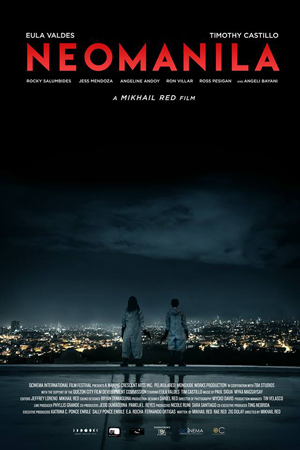Fantasia 2018, Day 6: Room Laundering
 I had one film on my schedule for Tuesday, July 17. It was a Japanese movie called Room Laundering, which looked like an odd fusion of comedy and horror. I wasn’t too sure what to make of it from the program description, but sometimes it’s the films that don’t lend themselves to easy description that’re the most rewarding. And so here.
I had one film on my schedule for Tuesday, July 17. It was a Japanese movie called Room Laundering, which looked like an odd fusion of comedy and horror. I wasn’t too sure what to make of it from the program description, but sometimes it’s the films that don’t lend themselves to easy description that’re the most rewarding. And so here.
Room Laundering (Rûmu rondaringu, ルームロンダリング) was directed by Kenji Katagiri, and co-written by Katagiri with Tatsuya Umemoto. The father of Miko (Elaiza Ikeda) died and her mother vanished when she was a child; after her grandmother dies when she’s 18, her uncle Goro (Joe Odagiri) takes her in and she begins to make a living as a room launderer. Japanese law requires landlords to tell prospective tenants if the previous tenant of an apartment died through murder or suicide, which would tend to cut demand for the unit — but the law doesn’t say they have to tell any further tenant beyond the first one following the death. Thus, Miko: she takes the apartment for a couple of days, counting as a tenant and relieving the landlord of their legal obligation. One problem emerges, and that is that Miko can see ghosts. They’re not very scary to her, though, as they can’t really do anything to the physical world, and on the whole are sad rather more than angry. But they do ask her to do things for them. One middle-aged punk rocker (Kiyohiko Shibukawa) wants her to send in an old demo tape to a record company, which he didn’t have the nerve to do when he was alive. A dead woman not too much older than Miko (Kaoru Mitsumune) wants her to find out who killed her — and here a mystery plot emerges. But there’s another mystery, as well: what happened to Miko’s mother? And beyond that — what’s her uncle Goro hiding? And can Miko, forbidden by her boss from associating with her neighbours, make a connection with the shy young man next door?
For all the mysteries, though, and for all the untimely deaths, this is a surprisingly light and charming film. My first reaction after it was over was that it was an unlikely fusion of Le fabuleux destin d’Amélie Poulain and Ringu, but much more the former than the latter — it takes place in Japan, and there is a ghost that wants people to be exposed to a tape, but beyond that it’s much more Amélie, if slightly more melancholic. The world in this film is improbable and sad, but the people are often surprisingly supportive. Not universally, but frequently. And, crucially, there’s a sense of the absurd in which the film takes a kind of life-affirming joy.


 Monday July 16 was an odd day, beginning with the neorealist neo-noir
Monday July 16 was an odd day, beginning with the neorealist neo-noir 


 You can tell a bit about an audience at Fantasia just from how they react to what goes on screen before the movie starts. You don’t get trailers before a movie, though sometimes you see a trailer for that year’s festival, using brief clips of several of the films playing that edition of Fantasia; this year’s trailer often drew cheers. You get a couple commercials, from a very limited selection; there’s one particular commercial for Nongshim noodles that’s played for several years and often draws warm applause for its earnestness. And of course there’s the meowing, an audience tradition — after the light goes down and before the movie starts, people in the audience meow, others shush them, still others make other animal noises. How much of any of this you get depends on how playful the audience is, and how excited they are for a crowd-pleasing thrill-ride. Which means, from the noise an audience makes before a film begins, you can tell what kind of a film you’re about to see.
You can tell a bit about an audience at Fantasia just from how they react to what goes on screen before the movie starts. You don’t get trailers before a movie, though sometimes you see a trailer for that year’s festival, using brief clips of several of the films playing that edition of Fantasia; this year’s trailer often drew cheers. You get a couple commercials, from a very limited selection; there’s one particular commercial for Nongshim noodles that’s played for several years and often draws warm applause for its earnestness. And of course there’s the meowing, an audience tradition — after the light goes down and before the movie starts, people in the audience meow, others shush them, still others make other animal noises. How much of any of this you get depends on how playful the audience is, and how excited they are for a crowd-pleasing thrill-ride. Which means, from the noise an audience makes before a film begins, you can tell what kind of a film you’re about to see.

